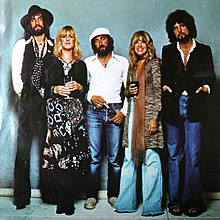Fleetwood Mac | |
|---|---|
 Fleetwood Mac in 1977. From left to right: Mick Fleetwood, Christine McVie, John McVie, Stevie Nicks and Lindsey Buckingham. | |
| Background information | |
| Origin | London, England |
| Genres | |
| Discography | Fleetwood Mac discography |
| Years active |
|
| Labels |
|
| Spinoffs | |
| Spinoff of | John Mayall & the Bluesbreakers |
| Past members | |
| Website | fleetwoodmacofficial |
Fleetwood Mac are a British-American rock band formed in London in 1967 by guitarist and singer Peter Green. Green named the band by combining the surnames of drummer Mick Fleetwood and bassist John McVie, who have remained with the band throughout its many lineup changes. Fleetwood Mac have sold more than 120 million records worldwide, making them one of the world's best-selling bands.
Primarily a British blues band in their early years, Fleetwood Mac achieved a UK number-one single in 1968 with the instrumental "Albatross" and had other UK top ten hits with "Man of the World", "Oh Well" (both 1969), and "The Green Manalishi (With the Two Prong Crown)" (1970). Green left the band in May 1970, with McVie's wife Christine McVie (who had previously contributed to the band as a session musician) joining as an official member on vocals and keyboards two months later. Other key members during the band's early years were Jeremy Spencer, Danny Kirwan, and Bob Welch. By the end of 1974, the band lacked a guitarist and a male vocalist. While Fleetwood was scouting studios in Los Angeles, he heard the American folk-rock duo Buckingham Nicks, consisting of guitarist and singer Lindsey Buckingham and singer Stevie Nicks. In December 1974, he asked Buckingham to join Fleetwood Mac. Buckingham agreed on the condition that Nicks could also join. The addition of Buckingham and Nicks gave the band a more pop rock sound, and their 1975 album Fleetwood Mac topped the Billboard 200 chart in the United States. Their next album, Rumours (1977) reached number one in multiple countries around the world and won the Grammy Award for Album of the Year in 1978.
The line-up remained stable through three more studio albums, but by the late 1980s began to disintegrate. After Buckingham left in 1987, he was replaced by Billy Burnette and Rick Vito, although Vito left in 1990 along with Nicks. A 1993 one-off performance for the first inauguration of President Bill Clinton reunited the classic 1974–1987 line-up for the first time in six years. A full-scale reunion took place four years later, and Fleetwood Mac released their fourth U.S. No. 1 album, The Dance (1997), a live album marking the 20th anniversary of Rumours and the band's 30th anniversary. Christine McVie left in 1998 after the completion of The Dance tour. Fleetwood Mac released their final studio album, Say You Will, in 2003. Christine McVie rejoined in 2014 for their On With the Show Tour. In 2018, Buckingham was fired and replaced by Mike Campbell, formerly of Tom Petty and the Heartbreakers, and Neil Finn of Split Enz and Crowded House. After Christine McVie's death in 2022, Nicks said in 2024 that the band would not continue without her.
In 1979, they were honoured with a star on the Hollywood Walk of Fame. In 1998, they were inducted into the Rock and Roll Hall of Fame and received the Brit Award for Outstanding Contribution to Music. In 2018, Fleetwood Mac received the MusiCares Person of the Year award from the Recording Academy in recognition of their artistic achievement in the music industry and dedication to philanthropy.
- ^ "Fleetwood Mac". Encyclopædia Britannica. 5 January 2015. Archived from the original on 6 September 2015. Retrieved 4 August 2015.
- ^ Smith, Chris (2006). The Greenwood Encyclopedia of Rock History: From Arenas to the Underground, 1974–80. Greenwood Press. pp. 88, 94–95, 215. ISBN 0-313-32937-0.
- ^ Brackett, Nathan; Hoard, Christian (2004). The New Rolling Stone Album Guide (4th ed.). Fireside. p. 303. ISBN 0-394-72107-1.
- ^ Bennun, David (13 February 2017). "How Fleetwood Mac Invented Goth". The Quietus. Retrieved 20 February 2017.